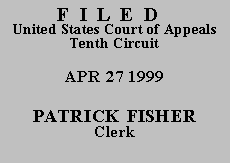

|
GLORIA UVON ROBINSON,
v.
NEVILLE MASSIE |
|
Before TACHA, McKAY, and MURPHY, Circuit Judges.
This case is before the court on Gloria Uvon Robinson's application for a certificate of appealability ("COA"). Robinson seeks a COA so that she can appeal the district court's denial of her 28 U.S.C. § 2254 habeas corpus petition. See 28 U.S.C. § 2253(c)(1)(A) (providing that no appeal can be taken from a "final order in a habeas corpus proceeding in which the detention complained of arises out of process issued by a state court" unless the petitioner first obtains a certificate of appealability).
This court concludes that Robinson is not entitled to a COA. As noted by the district court, Robinson's § 2254 petition was clearly filed outside of the outside of the one-year limitations period set out in 28 U.S.C. § 2244(d)(1). Furthermore, the tolling provision set out in § 2244(d)(2) is not implicated in this case because all of Robinson's state post-conviction proceedings were filed after the one-year limitations period set out in § 2244(d)(1) had already expired. Finally, this court agrees with the district court that neither Robinson's pro se status nor her lack of legal training, standing alone, is sufficient reason to equitably toll § 2244(d)(1)'s limitations period.
The district court conclusion that Robinson's petition is barred by the statute of limitations is not debatable among jurists of reason, subject to a different resolution on appeal, or deserving of further proceedings. See Barefoot v. Estelle, 462 U.S. 880, 883 n.4 (1983). Thus, Robinson has not "made a substantial showing of the denial of a constitutional right" and is not entitled to a certificate of appealability. 28 U.S.C. 2253(c)(2). For substantially those reasons set out in the magistrate judge's Report and Recommendation dated October 23, 1998, and the district court's Order dated December 3, 1998, this court denies Robinson's request for a COA and dismisses this appeal.
ENTERED FOR THE COURT:
Michael R. Murphy
Circuit Judge
*. This order and judgment is not binding precedent, except under the doctrines of law of the case, res judicata and collateral estoppel. The court generally disfavors the citation of orders and judgments; nevertheless, an order and judgment may be cited under the terms and conditions of 10th Cir. R. 36.3.